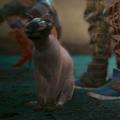sol2070 reviewed The Drowned World by J. G. Ballard
A classic sixties trippy SF
4 stars
(em português: sol2070.in/2024/12/livro-the-drowned-world-jg-ballard/ )
"The Drowned World" (1962, 198 pages) is one of the first novels by englishman J.G. Ballard, from the period when he was dedicated to more genre science fiction.
Known for the film adaptations of David Cronenberg's "Crash" (1996) and Steven Spielberg's "Empire of the Sun" (1987), Ballard combines delirious imagination and hypnotic prose like no other, transcending genres and entering the pantheon of literary genius.
This novel is an end-of-the-world dystopia with cities overrun by the sea, deadly heat and nature mutated by solar radiation. The planet's habitable zone has been reduced to the poles and the biospheric transformation also ends up affecting the human mind evolutionarily, making the story a perfect example of the altered consciousness of sixties New Wave science fiction.
A biologist studies the changes in an abandoned London and, for him, this is not necessarily a catastrophic scenario — as is usually …
(em português: sol2070.in/2024/12/livro-the-drowned-world-jg-ballard/ )
"The Drowned World" (1962, 198 pages) is one of the first novels by englishman J.G. Ballard, from the period when he was dedicated to more genre science fiction.
Known for the film adaptations of David Cronenberg's "Crash" (1996) and Steven Spielberg's "Empire of the Sun" (1987), Ballard combines delirious imagination and hypnotic prose like no other, transcending genres and entering the pantheon of literary genius.
This novel is an end-of-the-world dystopia with cities overrun by the sea, deadly heat and nature mutated by solar radiation. The planet's habitable zone has been reduced to the poles and the biospheric transformation also ends up affecting the human mind evolutionarily, making the story a perfect example of the altered consciousness of sixties New Wave science fiction.
A biologist studies the changes in an abandoned London and, for him, this is not necessarily a catastrophic scenario — as is usually the case in Ballard's stories, where people end up magnetized by the abyss.
I had read some of Ballard's later books when I was young. I only got to know his new wave phase recently, with the short story "The Voices of Time" (1960), which is very similar to the book. This made me put his entire bibliography on my reading list.


